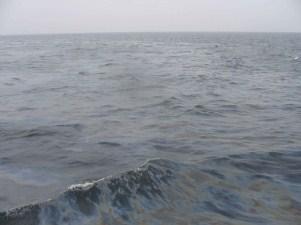$2 Million Penalty for Intentional Cover-Up of Oil Pollution and Obstruction of Justice

A recent decision of the federal court in New Orleans serves as an important reminder of the need for compliance with regulations relating the proper disposal of oily waste and the associated record-keeping requirements.
All discharges of sludge or oily bilge waste from a vessel must be recorded in the vessel’s oil record book. In this case, however, none of the illegal discharges were recorded.The case involved a violation of the Act to Prevent Pollution from Ships (APPS) and obstruction of justice: The bulk cargo vessel carried grain from New Orleans to various ports around the world. According to the plea agreement in the case, from April 2009 to April 2011 oily bilge waste and sludge was routinely discharged from the vessel directly into the sea without the use of required pollution prevention equipment. During that time, the crew intentionally covered up the illegal discharges of oil waste by falsifying the vessel’s oil record book.
The master had pleaded guilty to and was sentenced for conspiracy to obstruct justice for his role in destroying evidence and instructing crewmembers to lie to the Coast Guard during an inspection of the vessel in April 2011. The chief engineer had pleaded guilty to and was sentenced for conspiracy to obstruct justice for his role in falsifying the vessel’s oil record book and directing the discharge of oily bilge waste and sludge directly into the sea.
According to the master and chief engineer, senior management of the ship-operating company had directed the discharge of the vessel’s oily waste into the sea and refused to provide funding for the proper discharge of the oily waste to shore-side facilities, as well directing destruction of computer records and instructing the crew to lie to the Coast Guard. Both were sentenced to three years of unsupervised release and are not permitted to re-enter the United States during that time.
The operating company was ordered to pay an overall criminal penalty of $2 million. The National Fish and Wildlife Foundation will receive $250,000 to fund projects aimed at the restoration of marine and aquatic resources in the Eastern District of Louisiana.
As a condition of probation, the company is required to implement an environmental compliance plan which will ensure that any ship it operates complies with all maritime environmental requirements established under applicable international, flag state and port state laws. The plan ensures that employees and crew of any such vessel are properly trained in preventing maritime pollution. An independent monitor will report to the court about the company’s compliance with its obligations during the probation period.
Rear Admiral Roy A. Nash, Eighth Coast Guard District Commander commented: “Unfortunately, we continue to see many environmental crimes cases involving ocean-going commercial vessels. The Coast Guard will continue to hold non-compliant companies and operators accountable when they break the law and endanger the marine environment or public health. …”


